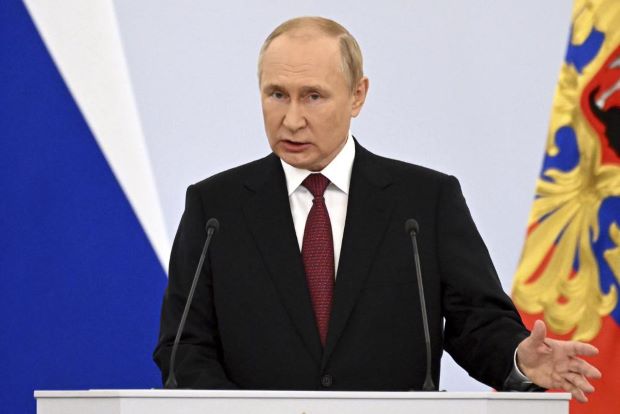Putin signs decrees declaring four regions of Ukraine part of Russia

By Anton Troianovski, Andrew E. Kramer and Dan Bilefsky
MOSCOW – Russian President Vladimir Putin signed decrees on Friday (30) to declare four Ukrainian regions part of Russia as the Kremlin seeks to solidify its tenuous hold over Ukrainian territory through a widely denounced illegal annexation.
“This is the will of millions of people,” he said. “This is their right, their inalienable right.”
The Russian leader spoke in the chandeliered St. George’s Hall of the Grand Kremlin Palace — the same place where he declared in March 2014 that the Ukrainian peninsula of Crimea was part of Russia.
Hundreds of Russian members of Parliament and regional governors sat in the audience for Putin’s speech, as well as many of his Cabinet ministers and the four Russian-imposed leaders of the occupied Ukrainian regions.
Ukraine and its Western partners have called the annexation illegal, with the Biden administration saying that it is ready to impose additional sanctions on Russia if it proceeds. As Putin spoke, leaders in the European Union issued a statement saying that they “firmly reject and unequivocally condemn” the annexation.
Putin declared Western elites “the enemy”, one that is seeking to destroy Russia. They “want to see us as a colony,” Putin said. “It is critically important for them that all countries give up their sovereignty in favour of the United States.”
He reeled off a litany of Western military actions stretching over centuries — from the British Opium War in China in the 19th century to Allied fire-bombings of Germany and the Vietnam and Korean wars.
The United States, he said, was the only country to have used nuclear weapons in war. “By the way, they created a precedent,” Putin added in an aside.
As the Kremlin planned the elaborate ceremony, Russia launched a whirlwind of strikes against Ukrainian towns and cities overnight Thursday (29) to Friday, including an attack on Zaporizhzhia that Ukrainian officials said killed 25 civilians — a reminder of its determination to continue fighting.
The moves are part of a carefully orchestrated process designed to provide a veneer of legality for the annexation of Donetsk and Luhansk provinces in eastern Ukraine and Kherson and Zaporizhzhia provinces in the south.
“People who live in Donetsk, Luhansk, Kherson and Zaporizhzhia are becoming our citizens — forever,” Putin said. “We call on the Kyiv regime to immediately cease fire and all military action.”
Ukraine has vowed not to recognize the illegal annexation, pledging to retake all territory that has been captured by Russia. “Russia will not get a new territory of Ukraine,” Ukrainian President Volodymyr Zelenskyy said in his overnight address. “Russia will annex itself to the catastrophe that it has brought to the occupied territory of our country.”
Friday’s events include a celebration on Red Square. Official ratification of the decrees will happen next week, said Dmitry Peskov, the Kremlin’s spokesperson.
The moves follow staged referendums held in occupied territory during a war in defiance of international law. Much of the provinces’ civilian populations has fled fighting since the war began in February, and people who did vote sometimes did so at gunpoint.
Even so, the annexations serve the Kremlin’s interest. Russia only partly occupies the four provinces, and Putin and his top aides have asserted that Moscow will then be defending its own territory from attacks by Ukraine, rather than the other way around.
Cementing Russia’s hold over the two eastern regions, an area collectively known as the Donbas that Putin considers his primary prize, could allow the Kremlin to declare a victory at a time when hawks in Russia have criticized Russian forces for not doing enough to prevent recent breakneck gains by Ukrainian forces in the south and northeast of the country.
But Putin nevertheless faces huge hurdles to reassert his control over an increasingly chaotic war, including a recent draft of hundreds of thousands of civilians into military service that has encountered opposition in Russia.
-New York Times


Comments are closed, but trackbacks and pingbacks are open.